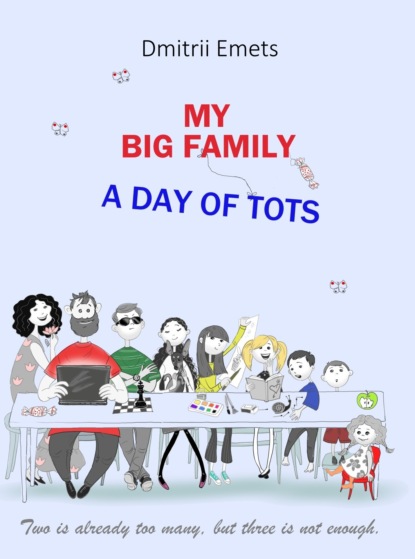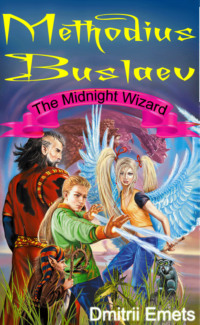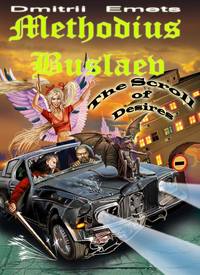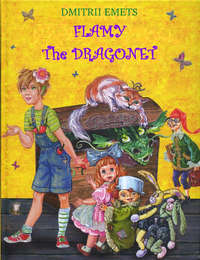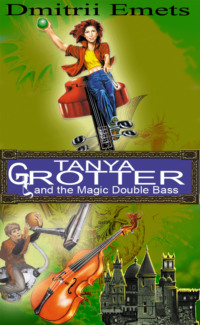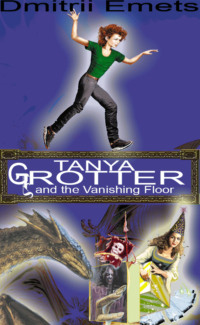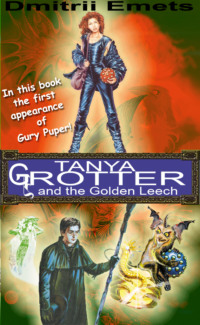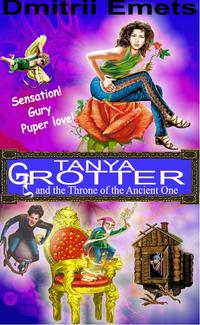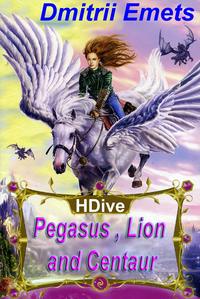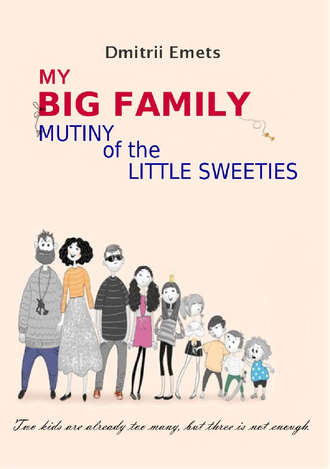
Полная версия
Mutiny of the Little Sweeties
“No one is touching it with hands! I’m touching it with a brush!” Vicky explained, and the dogs, having finished the sausages, rushed to the gate to bark at a lone cyclist.
Mama was afraid that people would think that these were their dogs because they ran out of their gates, and rushed to save the cyclist. The cyclist yelled and jerked his foot, trying to kick the dogs. As he rode down the figure-eight street, the dogs ran alongside and barked horribly, and the largest even seized his pant leg. However, as soon as the cyclist approached the exit from the street, the dogs immediately lost interest and went back home. At the same time, the bald dog managed to roll about in the dust, and all traces of iodine disappeared from it.
When Mama returned, Papa was unloading things from the van. Peter and Vicky were helping him, and Alex was roaming around the courtyard seeking out anything interesting. He discovered quite a lot of interesting things. A rusty rake without a handle, a watering can in the shape of a flamingo, originally pink but faded from the sun to almost white, two very old car license plates, and a big shoe. The shoe had probably been in concrete once, because it still had cement on it now and even its shoelaces were stiff.
Alex took the shoe, thought for a bit, held it in his hands, and then with the words, “Why is it lying in our yard?” threw it over the fence to the neighbour’s yard.
“Don’t!” Mama yelled, but she was too late. She only had time to hear as the shoe fell on the other side onto something metallic, because the sound was of scraping metal.
“Well! Now we have to go to the neighbour’s to apologize!” Mama said. However, before she took a step, the shoe flew back and plopped down between Mama and Alex.
“Wow!” Alex said and, faster than Mama could even move, tossed it back again.
This time it managed without crashing. Hence, the shoe had flown past the iron sheet. But after three seconds, the shoe appeared over the fence again, spinning in the air. Obviously, someone had launched it by the stiff lace. Peter, walking across the yard with boxes, dropped the boxes and rushed to catch the shoe. He managed to intercept it immediately; it barely appeared from behind the fence and Peter hammered it exactly like a volleyball.
“You’re sick!” Vicky said.
“Cool, eh? Flinging shoes at each other!”
“We started first!”
“We can! This shoe is not ours!”
“What do you mean it’s not ours? It’s on our lot!”
“It’s still not ours. Let them show the receipt that it’s ours!”
The shoe again whistled in the air. Peter grabbed his ear and slowly began to get upset.
“Ah! It hit you? Are you hurt?” Vicky exclaimed.
“No! It tickled me! Better you all leave, because I can miss!” Peter said in a voice terrible in its quietness.
Having taken the shoe by its laces, he twirled it and launched it up with force. Almost reaching the sun, the shoe, gaining speed, rushed down, and hung safely on the branches of the walnut tree.
Peter tried to get to it, but the upper branches of the walnut tree were brittle and could not hold his weight. Then Peter sent Alex, stating, “The chief monkey goes to the arena!”
A flattered “chief monkey” climbed up the walnut tree, but the branches began to crack even under him and the “monkey” came back with nothing. Seeing that time had passed but the shoe did not come flying, someone was romping about in disappointment on the other side of the fence. They heard something being dragged, most likely a chair, onto a sheet of iron, and then someone, sighing, scrambled onto it. A pale face with red-brown freckles appeared over the fence. It belonged to a boy about eleven.
“I would like to draw to your attention that throwing objects is rude!” the boy informed them. His head was swinging like a pendulum, first disappeared, and then appeared again.
“It’s you throwing? Now I’ll give it to you in the forehead! You hit me in the ear!” Peter yelled.
The pale boy looked seriously at Peter’s ear. “Wait a minute! Sorry to digress, but I must promptly finish an unpleasant matter!”
“What matter?”
The boy did not reply and disappeared, and a moment later, the iron sheet rattled terribly.
“What, running away?” Peter asked.
“No,” a weak voice came from the other side of the fence. “Not exactly. I fell off the chair.”
Peter realized that this was the same unpleasant matter that the boy had to finish. “How is it possible to fall from a chair?”
“I stood on its back, and it broke. Could you get me up please? I’m stuck.”
Peter and Vicky, followed by Kate, leapt over the fence and jumped down on the iron sheet. They were in a courtyard resembling a tennis racket. The racket handle was paved with coloured tiles. The round part of the racket was a small courtyard. Two cages were in the yard. Four chickens were languishing in the first. Five or six bikes were locked in the second cage adjacent to the wall.
A chair with a broken back lay on the iron sheet. A boy was lying on his back near the chair. His foot was stuck in the forked trunk of an acacia, on the thorny branches of which a great number of socks were drying. The boy was pressing his hand to his chest. His white t-shirt was slowly stained pink.
“Goodbye!” the boy said solemnly, looking not at them but at the sky. “Please tell my parents that I’ve died. Although, I think they’ll also guess!”
Vicky began to squeal, but Kate squatted down and asked why he decided that he was dying.
“I cut myself,” the boy informed her.
“Cut what? A vein?”
“No. I ripped open my finger on this iron sheet. Of course, my parents will now throw it out, but it’s already useless! A person cut by a rusty object dies within a few hours. Tetanus starts in him.”
Kate disengaged the boy’s leg from the forked acacia and helped him up. The boy stood and swayed. He pressed his injured hand to his chest and would not show it to anyone. His t-shirt continued to stain.
“Anyone home?” Kate asked.
“Yes.”
“Well, let’s go there! What’s your name?”
“Andrew! Andrew Mokhov,” the boy introduced himself.
Kate and Peter grabbed him by the elbows and led him away. Andrew Mokhov walked firmly, but only until he looked at his shirt. Then he began to pale and his knees buckled.
“Of course everything will be bad!” he said, making his way between the cage with bicycles and the cage with chickens. “That’s your car there? So big? I saw it from behind the fence. How many of you kids are there? Although you don’t have to answer. Already doesn’t matter to me now!”
“Seven,” Kate said.
“For some reason this would be valuable information!” Andrew admitted. “There are two of us. Nina and Seraphim.”
“Then why two? Aren’t you Andrew?”
“Correct. But when I die, only Nina and Seraphim will be left. I corrected the number, so as not to mislead you.”
“How old are Nina and Seraphim?”
“Nina’s fourteen, Seraphim’s eight. But he’s been lost since this morning, so Nina’ll probably remain alone.”
At the end of the yard, they saw a small house with cracked paint. It was entwined not with a grapevine but an ivy with a trunk the thickness of two human arms. In order that the roots of the ivy would not wreck the walls, pieces of wood were placed near them.
“Wow! Some house! Where did it come from?” Peter was surprised.
“It has always been here,” Andrew said with an air of importance. “Even before yours. Yours is sixty years old. Ours will soon be a hundred. See, what thick limestone.”
“Why didn’t we see your gate?”
Andrew sighed. “Because our gate isn’t here. There’s a wicket gate, but it’s far… it’s all very complicated in the city. A bunch of all kinds of side-streets and courtyards.”
“We already realized this when searching for our house,” Peter said.
“You realized nothing. The figure eight, it’s this here.” Andrew traced with a finger in the air. “And here’s one more lane, like a one. It turns out that it’s not 8 but 18. We’re on the 1 and you’re on the 8. In short, we’re closer over the fence. If you walk, then you have to go around everything in a circle.”
Andrew got up onto the porch and began to knock on the door with his forehead. No one answered, then Andrew pressed the handle with his elbow. “It’s open,” he said. “Come!”
They found themselves in an enclosed patio, where there was a gas boiler the same as the Gavrilovs’. Here was a large table in a kitchen area. Despite the bright day outside, the ivy shaded the window so much that the patio was lit by a chandelier with five dusty globes. A huge dried-up butterfly had hardened on one of the globes.
“We specifically did not take it off. For the sake of artistic shadows on the wall. Papa won’t allow it,” the boy explained.
“Your father’s an artist?”
“Photographer. Works on the sea front. And in schools too.”
Andrew sat quite calmly down on a chair, but looked by chance at his hand and, remembering that he was dying, started to slide from his chair onto the floor. Vicky looked at him with understanding. She loved to suffer when the appropriate occasion arose.
“Go and rinse out the wound!” Kate ordered.
“No way! I’m afraid!”
“Let me call your mama! Where is she?”
“Mustn’t disturb Mama! She was on the Internet all night and only just lay down. And Nina has gone for her guitar lesson…”
“Where’s your papa then? At work?”
“No. Papa’s searching for Seraphim. Seraphim is lost. He gets lost all the time…”
“First-aid kit?”
“In a white box!”
Kate began to look for a white box and discovered it to the right of the teapot. All its sides, the outside, and even the inside of the lid, were covered with many phone numbers. While Kate was looking for the box, she noticed many icons, including the Nursing Madonna[7] and Our Lady of Kazan,[8] on the patio walls. The stump of a candle stuck out of a candlestick by the window.
Kate looked at this with understanding. “You also go to church?”
“Mama, yes. Papa… well, probably also yes! But I’m an atheist!” Andrew said. “I don’t believe in God but in that when people die, they decompose to water and mineral elements.”
Peter looked at Andrew with great interest and scratched his nose. “And how do your parents feel about you being an atheist?” he asked.
“It’s alright. Mama says that atheism is a normal step towards faith and not a fear for God. Ouch, don’t pour iodine on the wound! Never iodine on the wound, only on the edges! Lord! That hurts!!!”
Using the fact that Andrew, blowing on the wound, involuntarily stopped grabbing her finger, Kate deftly put a bandage on his hand and wiped it with a wet towel. Then she forced Andrew to change his t-shirt. The spots of blood had barely disappeared, and Andrew immediately calmed down. Even his cheeks visibly turned pink.
“Well? Alive?”
Andrew was embarrassed to admit that he was alive. “My finger is throbbing!” he said, paying attention to his senses.
“A lot?”
“No, not a lot, but it’s throbbing. Come to my room! Just don’t yell! Mama’s sleeping behind the door!”
“Right now, no one to yell at here! No little ones!” Kate said and was mistaken. While they were busy, Alex managed to get over the fence and dragged Costa with him. No one dragged Rita over the fence, and she was screaming on the other side, demanding to join the team.
Andrew’s room turned out to be a real pirate’s nook with an upper deck supported by four wooden pillars. A rope ladder hung from the deck. True, it turned out that Andrew did not use it because he was lazy. On a littered table were textbooks for the fifth grade, a tablet, and a laptop without a single key. Only two or three elastics and some plastic parts were intact.
“Don’t pay attention to the keyboard!” Andrew said grimly. “Seraphim picked them off when I sat on his grasshopper. He didn’t believe that it was an accident.”
“A grasshopper?”
“Yes. He fed the grasshopper grass and it was all around the whole house. He deleted everything from my desktop. Now I have an eighteen-character password. I type it in front of Seraphim, but he can’t remember.”
“How do you enter the password?”
“On an external keyboard. I hide it just in case… Hey! Is this also your brother? Get my paper from him!”
“Also your brother” turned out to be Costa, who had pulled some paper off the table to draw on. They caught Costa and took the sheet of paper from him. Costa wanted to be indignant but felt that there was no sympathetic public near at hand, and he very quietly got busy examining a fishing bobber, which glowed when shaken.
“What’s this formula? You like chemistry?” Peter asked, looking at the sheet rescued from Costa’s hands.
Andrew hastily grabbed back the sheet written on with a wide marker. He listened, looked out the window, and whispered, “Can you keep a secret?”
“Yes!” Peter said.
“Then here it is! Do you know where to buy uranium?”
“What kind of uranium?”
“Enriched. I know how to make an atomic bomb, only I have no uranium!”
“At a drugstore?” Alex naively asked.
“Uranium? At a drugstore?” Peter laughed his signature laugh, but Andrew looked at Alex without irony, which Alex appreciated very much.
“You don’t understand! Such things aren’t in drugstores. They wouldn’t even sell me manganese! Said it’s forbidden to sell it.”
Next to Andrew’s table was a huge cookie box filled to the brim with all sorts of technical treasures: parts of phones, coils of wire, tools, batteries, electric toys, and constructor components. It was worthwhile for Alex to see all this, as he stuck to Andrew exactly like a boy from the Middle Ages to the Pied Piper.
Therefore, when Mama began to shout from behind the fence and call them to breakfast, the older children left immediately, but Alex stayed with Andrew. And Costa also stayed. He generally tagged after Alex all the time, and whatever Alex was interested in, he roughly determined that he had to take it away or steal it.
Alex and Andrew started to rummage in the box. From time to time Andrew groaned, trying to bend the cut finger. They made a catapult, which was to throw batteries with an ignition mechanism fastened to them. Andrew gutted ignition mechanisms from broken plastic lighters. According to the design, all this should explode and kill everyone on site, because Andrew read somewhere that batteries contain metal salts, but also discharge gas, which would certainly ignite with the mechanism. Costa was jostling near them, grabbing everything, and interfering. Then they climbed the rope ladder to the upper deck on the pillars. Costa could not climb up the ladder because of his left hand and was starting to get rowdy below. They paid him no attention. Then Costa went out into the yard, picked up clumps of dirt, returned and began to throw dirt at them.
“Are you nuts, kid? What do you want?” Andrew was mad when a piece of dirt hit him on the nose.
“It’s Costa,” Alex prompted.
“Costa! What do you want?”
Costa did not know what he wanted and pouted angrily. “Say ‘table’!” he demanded in a voice trembling with anger.
“Table!” Andrew repeated obediently.
“Table! Your grandma’s a boxer!” Costa shouted. “Ha-ha-ha! Say ‘nose’!”
“Nose!”
“Nose! Your grandma’s a boxer!”
Andrew shook his head. “No, doesn’t rhyme! You can’t say ‘your grandma’s a boxer’ there. Now say ‘sermon’!”
“Sermon!” Costa repeated.
“Sermon! Your mama loves German! Remember?”
Costa rushed ecstatically into the yard and began to shout for them to take him home. At first, no one heard him, and then Papa sent Peter, who passed Costa over the fence to Papa.
Costa was trembling with excitement. “Papa, Papa!” he yelled. “Say ‘sermon’!”
“Sermon!”
“Your grandma’s a boxer!” Costa said and laughed happily.
Chapter Five
A Bedtime Story
Modern children are taught to fear everything. Children walking along the street should look no higher than the asphalt, and if someone accidentally says “Hello!” to them, they should quickly change into a run after poking the person in the eye with a pencil beforehand. Such children, who see danger everywhere, can grow up only as hunted animals.
Joseph Emets, Hungarian philosopherPapa was busy searching for beds the entire second half of the day. Mama, who initially wanted to pick out everything herself, stayed home with the children. She had to get Costa and Rita down for a nap.
There were three furniture stores in the city. One was in some basement, one on the main street, and one in a glass hangar. The shop on the main street sold office furniture, revolving chairs and huge desks for managers. Papa wanted to buy himself such a desk for his office, but he looked at the price and decided to leave it for later, when he would already be writing the brilliant novel.
Yes! Papa had a dream – to write a brilliant novel. Sometimes this novel really was stirring in him, it was so dying to come into the world. But Papa pushed it back into his soul with both hands and said to it, “Sit quietly, mature!” So, for the time being, the brilliant novel fought its way out only in fragments.
In the glass hangar were plenty of nice sofas, kitchen units, and bedroom furniture. There were beds too, but none shorter than 200 cm. Papa calculated what it would be if he bought beds of 200 cm for all seven children, and realized that he did not need this train of seven cars stretching to fourteen metres in the house. Hence, he bought only one such bed for Peter, who was a metre ninety tall. Thus, there even left some margin for the kid to grow in the direction of a decent member of society. Though in their former two-bedroom, Peter lodged perfectly well with knees drawn in on a small sofa.
There was nothing else interesting in the glass hanger, and Papa went to the store in a basement. Here he immediately saw a bunk bed and, pleased, he rushed to the sales clerk, who hid a half-eaten egg in a new nightstand and smiled questioningly, waiting for a question.
“Can I have two more of these?” Papa asked.
The sales clerk explained patiently that what Papa saw in the store was all they had. If Papa did not see something, then they did not have it. For example, he did not see the moon, so it meant it was not for sale in the store. However, if Papa insisted that he wanted to buy exactly three beds, they were ready to do the impossible. They would get the money from Papa now and give him the beds in August, when they would have a new shipment.
Papa turned down such a scheme and, having bought the bunk bed that was there, began to think where to find two more. In the end, he hit upon buying the city newspaper ads and found another bed. Papa phoned and drove around the city, looking for the necessary street.
The street turned out to be in Outskirts, the name of the area bordering the city. There were many identical parallel little streets and one-story houses very similar to one another and overgrown with grapevines, cherry trees, and some southern plants, blooming.
An old married couple opened the door, both strong, tanned, and, similar to the houses on the street, looking like each other. The bunk bed they showed Papa was a little shaky, but then a metal ladder was attached to it with hooks, and a huge number of stickers and chewing gum trading cards were glued on both the inside and outside of the bed. Some of the trading cards seemed awfully familiar to Papa. Terminator, Terminator-3, Rambo! Wow, hello childhood!
“Your children no longer need the bed?” Papa asked cautiously.
“No. They’re already grown. The son has gone swimming and the daughter’s in Kamchatka,” the chubby head of the family said and winced, because his wife stepped on his foot so he would not chat too much. She was afraid that Papa would not buy the bed, thinking that it was ancient.
“They barely slept on it! We bought the bed when they were in seventh grade,” she hastily said. “And we’ll even give you the mattresses!”
Papa immediately agreed and together with the old man began to disassemble the bed. It was secured with such strong bolts that Papa was immediately reassured. A bed with such bolts simply could not fall apart, rather everything else around would fall apart first. If it was unsteady, one could put something under the legs!
Конец ознакомительного фрагмента.
Текст предоставлен ООО «ЛитРес».
Прочитайте эту книгу целиком, купив полную легальную версию на ЛитРес.
Безопасно оплатить книгу можно банковской картой Visa, MasterCard, Maestro, со счета мобильного телефона, с платежного терминала, в салоне МТС или Связной, через PayPal, WebMoney, Яндекс.Деньги, QIWI Кошелек, бонусными картами или другим удобным Вам способом.
Примечания
1
Woe from Wit is a comedy in verse by Alexander Sergeyevich Griboyedov (1795–1829), Russian diplomat and playwright, as well as poet and composer. The play is a satire about post-Napoleonic Moscow society. It was written in 1823 but only first published in 1833. It was compulsory reading in school during Soviet times.
2
Megamind is the super-intelligent alien protagonist of the 2010 3D computer-animated superhero action comedy of the same name.
3
The Headless Horseman (1865-66), a novel by Thomas Mayne Reid (1818-83), an American novelist of adventure novels, is based on a south Texas folk tale.
4
It is unclear whether Schwarz is a historical or purely legendary figure. It has been suggested that he was a historical alchemist of the late 14th century who developed gunpowder in Germany.
5
The International Union for the Conservation of Nature (IUCN) Red List of Threatened Species.
6
Valerian is a perennial flowering plant with the roots being used in herbal medicine, since valerian root has sedative and anxiolytic effects.
7
The Nursing Madonna shows the Virgin Mary breastfeeding the infant Jesus, a depiction representing Humility.
8
Our Lady of Kazan is an icon representing the Virgin Mary as the protector and patroness of the city of Kazan.


